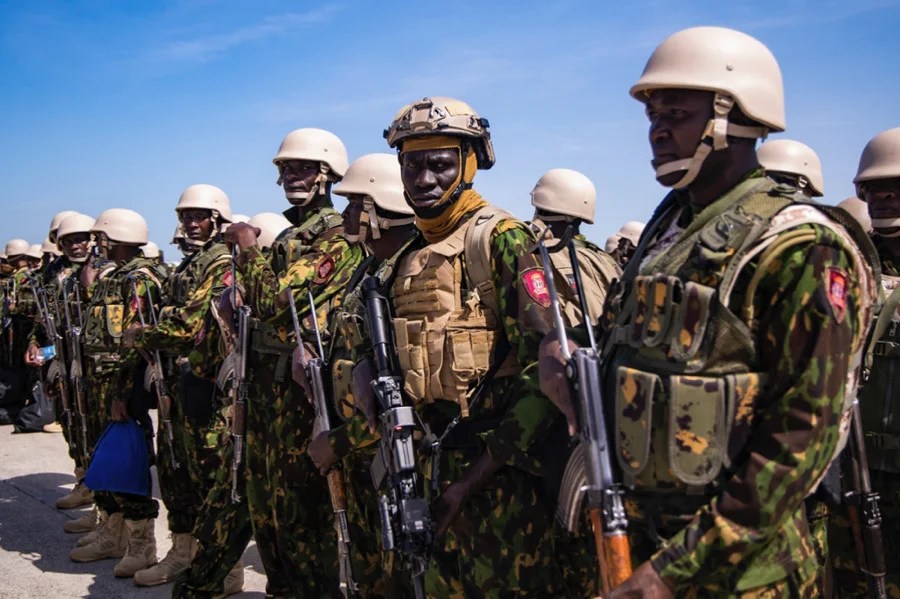The division of the metropolitan area into “lost territories” was very successful, with the eventual landing of foreign troops the day after the 221st anniversary of the creation of the flag.
The indigenous army, which displayed its two-tone during the conquest of independence, even before the existence of Kenya, is today degraded by the distorted sons of the country, who put their petty interests before the Republic. The gangs, on a mission of “commande”, have won the battle to lead Haiti into a new military occupation which does not yet have a name.
The PHTK Tet Kale-SDP-Fusion-OPL regime still in power can be proud of having succeeded in its mission to make Haiti the one and only country in the Caribbean under the domination of foreign troops. And it’s not a joke. Long live Kenya, manna from heaven.
Barring unforeseen obstacles, Kenyan police officers are expected to arrive in Port-au-Prince this week as part of the multinational security support mission (MSS) in Haiti. The final green light for Kenya’s deployment comes after months of legal battle.
Parliament and Cabinet had approved the mission to deploy 1,000 officers to the gang-ravaged Caribbean country in November 2023, but the planned deployment stalled following a court ruling against it for legal reasons and the April resignation of interim Haitian Prime Minister Ariel Henry, which put the deployment on hold.
The first group of 200 police officers is expected to arrive in Haiti on May 23-24, which will coincide with a state visit by President William Ruto and his delegation to the United States. The deployment comes seven months after the Security Council gave Kenya the green light to lead the multinational mission.
“Expect the first boots to hit the ground in Haiti. This time we are serious,” a senior official from the Ministry of Interior and National Government Administration told the Global Initiative Against Transnational Organized Crime (GITOC).
The elite officers come from the reconnaissance brigade, rapid deployment force and special operations group. The latter fought Al-Shabaab insurgents along the Kenya-Somalia border. They are no strangers to violent armed actors.
Half the contingent is expected to secure critical facilities, including the airport, while the rest will take part in close-quarters combat against gangs, who have taken control of more than 80% of Port-au-Prince. A team of Kenyan reconnaissance officers and police officers was sent to the United States late last year for special training to prepare for the mission.
Torn by gang violence that left around 2,500 dead in the first three months of the year and the humanitarian crisis that followed, Haiti launched an appeal for international aid in 2023, which prompted the United Nations Security Council to adopt the mission in October 2023. Kenya’s volunteer police contingent will lead the mission, which aims to stabilize the country.
News of the deployment initially sparked enthusiasm in the Kenyan security sector, but was then almost swept away by a court ruling in Nairobi in January that declared the planned deployment of Kenyan police officers unconstitutional. .
Justice Chaacha Mwita said the two countries lacked the required reciprocal agreement and the president did not have the constitutional mandate to deploy police officers abroad. President Ruto and Ariel Henry had to sign a bilateral agreement on March 1, 2024 to circumvent the Court’s decision.
The day before the deal was signed, Haitian gangs launched coordinated attacks targeting critical infrastructure, including the airport. The gangs freed thousands of prisoners after taking control of two prisons. Henry resigned and a state of emergency was declared.
Opposition leader Raila Odinga asked MPs not to approve the deployment in the National Assembly. Public opinion was also opposed to the deployment and the media was skeptical.
“There were issues related to the inherent risks of the deployment, the state-sanctioned secrecy of the mission, and the behind-the-scenes role played by the Americans. It was not seen as a Kenyan initiative,” says George Musamali, a Nairobi-based security analyst.
But today the sentiment seems to be moving away from the initial skepticism. Several reasons can explain this change. The country’s politics have become less divisive since the 2022 presidential elections. The government has said it supports Raila’s candidacy for chair of the African Union Commission.



